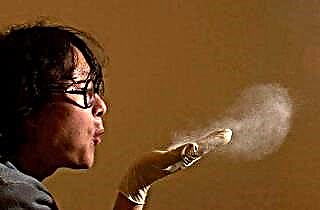Coughing is a natural defense reaction of the body. Thus, it cleans the mucous membranes of the respiratory system from periodically accumulating dust, mucus, and harmful microbes that get there.
There is a so-called physiological cough. It manifests itself without any additional cold symptoms. You do not need to be afraid of it - it is necessary to keep the respiratory system clean. But if we are talking about a prolonged dry (without coughing up phlegm) cough, you should be on your guard.
The relationship of dry cough with the respiratory system
 Such a symptom may signal about not at all harmless diseases. So what are the causes of a dry cough?
Such a symptom may signal about not at all harmless diseases. So what are the causes of a dry cough?
- Diseases of the upper respiratory tract. If the immune system is functioning properly, the body copes well with such diseases on its own. But if the immune system is weak for various reasons, then it can be promoted with antibiotics or antiviral medicines. Note that with influenza (parainfluenza), it is imperative to consult a doctor. Influenza is not such a simple disease as it seems at first glance. In recent years, he has become very aggressive and causes a large number of serious complications. So why is there a prolonged dry cough with ARVI, flu or any other infectious disease affecting the upper respiratory tract? Among the main reasons are:
- a significant decrease in the protective properties of the immune system;
- provocative factors that aggravate dry cough and increase its duration (addictions, dry air in the room, lack of fluid intake during illness).
- the addition of a secondary infection or the development of complications after an illness of a viral nature (a person is faced in this case with bacterial pharyngitis, tracheitis, bronchitis or pneumonia).
 Diseases of the nasopharynx. With sinusitis, sinusitis or rhinitis of various origins, dry cough at night appears as a result of postnasal flow syndrome. What it is? When the ailments mentioned take on a chronic form, mucus that accumulates in the sinuses of the nose can drain along the back of the pharynx. Thus, irritation of the cough receptors, located in the tracheobronchial tree, occurs. At first glance, such a cough is wet (productive), since it produces nasal mucus. However, it is still correct to classify it as dry.
Diseases of the nasopharynx. With sinusitis, sinusitis or rhinitis of various origins, dry cough at night appears as a result of postnasal flow syndrome. What it is? When the ailments mentioned take on a chronic form, mucus that accumulates in the sinuses of the nose can drain along the back of the pharynx. Thus, irritation of the cough receptors, located in the tracheobronchial tree, occurs. At first glance, such a cough is wet (productive), since it produces nasal mucus. However, it is still correct to classify it as dry.- Laryngitis, pharyngitis and tracheitis. One of the most common causes of a dry, wasting cough. The peculiarity of pharyngitis is that with this ailment the mucous membrane of the pharynx becomes inflamed, and laryngitis - in the inflammation of the laryngeal mucosa. Pharyngitis and laryngitis can occur not only acutely, but also chronically. With these diseases, the cough is usually barking and worse at night. If a person is forced to breathe frequently cold, excessively dry or dusty air, tracheitis may develop. Its characteristic feature is the same debilitating cough in the evenings.
- Whooping cough, measles and false croup. Whooping cough may well be the cause of dry cough in adults. Especially if the immune system is weakened. Whooping cough attacks are sometimes so strong that they even provoke vomiting. In this case, it is necessary to be treated with special antitussive agents - "Sinekod", "Libeksin", "Bronholitin" and similar drugs. However, it is highly discouraged to take them on your own without a doctor's prescription.
 Diseases of the lungs and pleura (pneumonia and pleurisy) are also often accompanied by a dry and painful cough without phlegm. True, in most cases it comes "in a set" with a significantly increased temperature, shortness of breath and chest pains.
Diseases of the lungs and pleura (pneumonia and pleurisy) are also often accompanied by a dry and painful cough without phlegm. True, in most cases it comes "in a set" with a significantly increased temperature, shortness of breath and chest pains.- Pneumonia in an atypical form. Chlamydia and mycoplasma may well be the culprits of a prolonged unproductive cough. These harmful microbes are capable of provoking the occurrence of SARS, a chronic form of bronchitis with periodic relapses. To determine the pathogen that caused bronchitis or pneumonia, you can simply donate blood for analysis using the ELISA method.
- Tuberculosis. The first bells of developing tuberculosis of the larynx, trachea, bronchi or lungs are a chronic dry cough, an obsessive desire to cough, general weakness. But the body temperature can rise only to subfebrile, and then in the evenings. Therefore, a person can lose vigilance and miss the first signs of a formidable disease. This disease today poses a particular danger, since a huge number of its drug-resistant forms have already been recorded. They need to be treated for a long time, but it is not cheap. If the patient suffers from any chronic illness or is infected with HIV, resistant form of tuberculosis can kill him.
 Neoplasms in the respiratory organs. If an unproductive cough does not stop for a long time and bothers at any time of the day, you must immediately consult a doctor, donate blood for analysis, and take an X-ray of the lungs. If necessary, the doctor may prescribe bronchoscopy, magnetic resonance imaging (MRI) of the mediastinal organs (for example, the aorta, heart, bronchi), as well as donate blood for the determination of tumor markers. All these examinations are needed in order to refute or confirm the presence of cancer of the mediastinal organs, throat, trachea, bronchi or lungs. If any of the listed ailments are detected in time, this will significantly increase the chances of a full recovery or, at least, significantly prolong a person's life.
Neoplasms in the respiratory organs. If an unproductive cough does not stop for a long time and bothers at any time of the day, you must immediately consult a doctor, donate blood for analysis, and take an X-ray of the lungs. If necessary, the doctor may prescribe bronchoscopy, magnetic resonance imaging (MRI) of the mediastinal organs (for example, the aorta, heart, bronchi), as well as donate blood for the determination of tumor markers. All these examinations are needed in order to refute or confirm the presence of cancer of the mediastinal organs, throat, trachea, bronchi or lungs. If any of the listed ailments are detected in time, this will significantly increase the chances of a full recovery or, at least, significantly prolong a person's life.
Other reasons
 Over the past few decades, the number of people who have a variety of allergic reactions has increased significantly. This is especially evident in children. However, adults are not lagging behind either. Almost everyone today is allergic to anything. If there are no reactions to food, it means that there are ticks, flowering plants, pet hair, household dust. And hay fever (as allergists call the spring-summer allergy to pollen) is generally considered the scourge of modern people. Its characteristic manifestations are: dry cough, repeated sneezing, runny nose, lacrimation and unbearable itching of the mucous membranes.
Over the past few decades, the number of people who have a variety of allergic reactions has increased significantly. This is especially evident in children. However, adults are not lagging behind either. Almost everyone today is allergic to anything. If there are no reactions to food, it means that there are ticks, flowering plants, pet hair, household dust. And hay fever (as allergists call the spring-summer allergy to pollen) is generally considered the scourge of modern people. Its characteristic manifestations are: dry cough, repeated sneezing, runny nose, lacrimation and unbearable itching of the mucous membranes.
There are other reasons that cause this cough:
- Bronchial asthma. Unfortunately, this disease is now very common. Its hallmark symptoms are a chronic, debilitating, unproductive cough followed by attacks of suffocation. This ailment is a complex pathology, the causes of which are hidden in a general dysfunction of the immune and nervous systems, supplemented by allergies.
- Diseases of the gastrointestinal tract. Reflux esophagitis, esophageal-tracheal fistula, and esophageal diverticula may present with a dry, annoying cough. It appears reflexively, after eating. At the same time, the body temperature remains normal.
- Parasites (worms). When a person becomes infected with ascaris, their larvae enter the pulmonary circulation. If the worms end up in the trachea, bronchi and lungs, cough receptors are irritated. Parasites can remain in the lung tissue for a period of time, provoking an annoying dry cough. It should be noted that the so-called migration phase with confirmed ascariasis lasts from 8 to 14 days.
 Occupational diseases.A dry cough may well appear as a result of work in an unhealthy workplace. If a lot of toxic substances are thrown into the air every now and then, it is a matter of time before workers have a dry cough. Coal mining and stone working workers often suffer from lung silicosis. In addition, among the occupational diseases characterized by such a cough, fibrosing alveolitis (farming disease) should be distinguished. An unproductive cough is just the beginning of the development of this pathology. The outcome is very sad - the progression of severe respiratory failure.
Occupational diseases.A dry cough may well appear as a result of work in an unhealthy workplace. If a lot of toxic substances are thrown into the air every now and then, it is a matter of time before workers have a dry cough. Coal mining and stone working workers often suffer from lung silicosis. In addition, among the occupational diseases characterized by such a cough, fibrosing alveolitis (farming disease) should be distinguished. An unproductive cough is just the beginning of the development of this pathology. The outcome is very sad - the progression of severe respiratory failure.- Taking certain medications. These are ACE inhibitors. They are used to lower high blood pressure and treat diseases of the heart and blood vessels. According to statistics, 20% of patients taking these drugs suffer from dry cough. It is very easy to check for side effects. Try canceling the medication. If the cough disappears immediately after withdrawal, then it was a side effect.
The effect of household toxic substances can also cause a cough. If you regularly use household chemicals that contain chlorine, laundry detergents and other household chemicals, an allergic dry cough may well develop.
 Also, the air of large cities and huge volumes of exhaust gases play an important role in its occurrence.
Also, the air of large cities and huge volumes of exhaust gases play an important role in its occurrence.
Remember exactly when you started coughing. Perhaps you bought something new from furniture, brought another new household appliance into your house, or renewed your renovation? Today in industry (especially for the manufacture of building materials, furniture, plastic and even toys for children), a large amount of toxic substances is often used. They are capable of irritating the mucous membranes in the nasopharynx, bronchi. With their prolonged exposure to the body, chronic poisoning can occur.
Please note that if a sufficiently large number of the above products are concentrated in the room where you are constantly located, this may cause an unproductive cough. Especially if you smell them not very pleasant.
Summing up
 Do not forget that a dry cough is not always a symptom of a common cold, which can be easily cured with “grandmother's” recipes. Sometimes it indicates serious health problems that can even threaten a person's life. Therefore, self-medication in this case is strongly discouraged.
Do not forget that a dry cough is not always a symptom of a common cold, which can be easily cured with “grandmother's” recipes. Sometimes it indicates serious health problems that can even threaten a person's life. Therefore, self-medication in this case is strongly discouraged.
So, if a dry cough suddenly appears, and the cause is not immediately determined, you need to pay attention to the symptoms that accompany it. For example, tuberculosis is always accompanied by a slightly elevated temperature and weight loss, and tracheobronchitis of viral origin is accompanied by chest pain.
If you have been coughing for a long time, see your doctor immediately. However, do not expect that after an elementary examination, you will immediately receive a list of miraculous drugs that will solve your problem.
To make a diagnosis, the doctor will refer you for tests and additional examinations. You will need to take blood and sputum for analysis, do spirometry and spirography, X-ray, if necessary - bronchoscopy, bodyplethysmography, tussography, CT and MRI.

 Diseases of the nasopharynx. With sinusitis, sinusitis or rhinitis of various origins, dry cough at night appears as a result of postnasal flow syndrome. What it is? When the ailments mentioned take on a chronic form, mucus that accumulates in the sinuses of the nose can drain along the back of the pharynx. Thus, irritation of the cough receptors, located in the tracheobronchial tree, occurs. At first glance, such a cough is wet (productive), since it produces nasal mucus. However, it is still correct to classify it as dry.
Diseases of the nasopharynx. With sinusitis, sinusitis or rhinitis of various origins, dry cough at night appears as a result of postnasal flow syndrome. What it is? When the ailments mentioned take on a chronic form, mucus that accumulates in the sinuses of the nose can drain along the back of the pharynx. Thus, irritation of the cough receptors, located in the tracheobronchial tree, occurs. At first glance, such a cough is wet (productive), since it produces nasal mucus. However, it is still correct to classify it as dry. Diseases of the lungs and pleura (pneumonia and pleurisy) are also often accompanied by a dry and painful cough without phlegm. True, in most cases it comes "in a set" with a significantly increased temperature, shortness of breath and chest pains.
Diseases of the lungs and pleura (pneumonia and pleurisy) are also often accompanied by a dry and painful cough without phlegm. True, in most cases it comes "in a set" with a significantly increased temperature, shortness of breath and chest pains. Neoplasms in the respiratory organs. If an unproductive cough does not stop for a long time and bothers at any time of the day, you must immediately consult a doctor, donate blood for analysis, and take an X-ray of the lungs. If necessary, the doctor may prescribe bronchoscopy, magnetic resonance imaging (MRI) of the mediastinal organs (for example, the aorta, heart, bronchi), as well as donate blood for the determination of tumor markers. All these examinations are needed in order to refute or confirm the presence of cancer of the mediastinal organs, throat, trachea, bronchi or lungs. If any of the listed ailments are detected in time, this will significantly increase the chances of a full recovery or, at least, significantly prolong a person's life.
Neoplasms in the respiratory organs. If an unproductive cough does not stop for a long time and bothers at any time of the day, you must immediately consult a doctor, donate blood for analysis, and take an X-ray of the lungs. If necessary, the doctor may prescribe bronchoscopy, magnetic resonance imaging (MRI) of the mediastinal organs (for example, the aorta, heart, bronchi), as well as donate blood for the determination of tumor markers. All these examinations are needed in order to refute or confirm the presence of cancer of the mediastinal organs, throat, trachea, bronchi or lungs. If any of the listed ailments are detected in time, this will significantly increase the chances of a full recovery or, at least, significantly prolong a person's life. Occupational diseases.A dry cough may well appear as a result of work in an unhealthy workplace. If a lot of toxic substances are thrown into the air every now and then, it is a matter of time before workers have a dry cough. Coal mining and stone working workers often suffer from lung silicosis. In addition, among the occupational diseases characterized by such a cough, fibrosing alveolitis (farming disease) should be distinguished. An unproductive cough is just the beginning of the development of this pathology. The outcome is very sad - the progression of severe respiratory failure.
Occupational diseases.A dry cough may well appear as a result of work in an unhealthy workplace. If a lot of toxic substances are thrown into the air every now and then, it is a matter of time before workers have a dry cough. Coal mining and stone working workers often suffer from lung silicosis. In addition, among the occupational diseases characterized by such a cough, fibrosing alveolitis (farming disease) should be distinguished. An unproductive cough is just the beginning of the development of this pathology. The outcome is very sad - the progression of severe respiratory failure.

